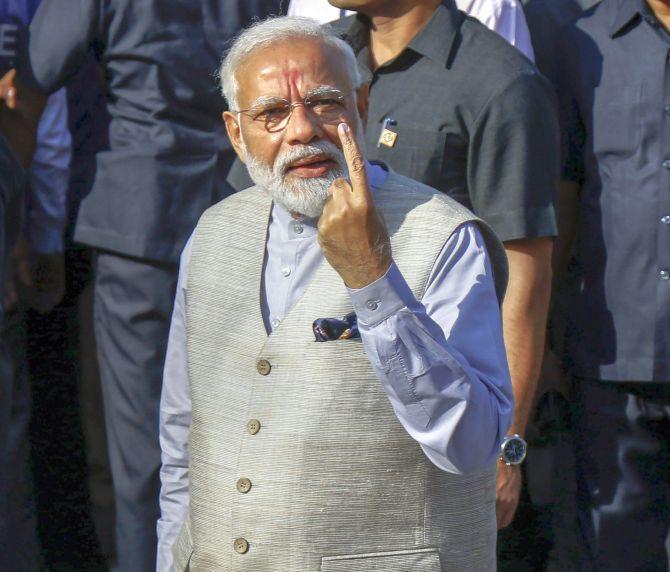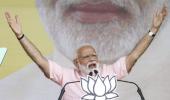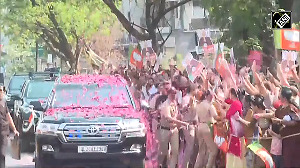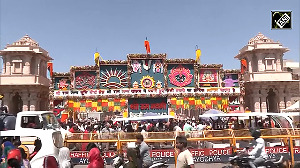In 2019, in Modi we have a leader who has not shied away from showcasing a robust and aggressive response to the Pulwama and Uri attacks, says Colonel Anil A Athale (retd).

All elections to the Lok Sabha are important, but in retrospect some are more important than others as they set a new trend in the nation's trajectory. In that sense, and in a long term view, the 2019 election is a continuation of the trends set by the 2014 election.
That election saw the Narendra Damodardas Modi-led Bharatiya Janata Party essentially appeal to the aspirations of Indians and also invoke national pride. Emphasis on middle class Indians was also 'new' for India. The Left-leaning Macaulayan elite was horrified at the 'use' of religion then and now.
To their horror, that appeal to Hindutva continues across the spectrum. How else does one explain the new found love for temple visits and wearing the janeu (Hindu sacred thread)?
Even a casual observer of American elections will notice how every candidate (even a darling of the leftist elite like Barack Obama) asserted that they were good Christians. But our Anglophile and rootless elite scoffed at the display of any Hindu religiosity as automatically 'communal'. This new-found love for one's Hindu roots is a complex phenomenon that defies a single answer.
Unlike his 'secular' successors, Mahatma Gandhi was a deeply religious person and not shy or ashamed of his Hindu-ness. This typical fashion of being ashamed of one's own faith began with the overwhelming influence of Marxists who invoked the dictum of 'religion is the opiate of the masses', never mind that Marx was referring to 'organised' religions and not Hinduism which is more a way of life rather than a monolithic and united group.
In fact, this very lack of unity among Hindus as a religious community was exploited by political parties right till 2014. That election showed that minority vote bank politics is now past its expiry date.
The trend continues even in 2019. There is very little talk of or too much analysis of where the minority vote will go. Neither have political parties made a beeline to assorted imams.
Interestingly, this rise of Hindu pride possibly began some times during the IT boom when Indian talent got worldwide recognition. The Indian Diaspora was the first to articulate this pride. But the seeds of revival of our past glory began in the 1980s with Rajiv Gandhi.
No, I am not referring to the hastily conducted shilanyas at Ayodhya in 1989, but to the Rajiv Gandhi government's decision to telecast the Ramayan and Mahabharat serials on government-owned monopoly Doordarshan (there being no privately owned television channels then).
In fact, the modern political history of India could well be divided between the pre-Ramayan serial and post-Ramayan serial. It is indeed an irony that the same party saw it fit to file an affidavit in 2012 denying the historicity of Ram!
The BJP has continued the evolution initiated by Rajiv Gandhi and reaped a political harvest, and continues to do so in the present. Modi, by owning and making the already popular yoga as a potent symbol of Indian pride, tapped into this urge.
The chattering classes are also aghast at the prominence that national security seems to have attained in the current electoral discourse. People seem to have forgotten that it was on the issue of national security that the late Rajiv Gandhi won the biggest mandate in a general election in 1984. A mandate bigger than what Jawaharlal Nehru or Indira Gandhi won in their heyday.
In retrospect, if India had reacted to the Mumbai attacks of 26/11 with an air strike, we would have got wide international support as besides Indians, the nationals of many other countries including the US were targeted. Failure to act in 2008 is in stark contrast to the proactive measures in 2016 and 2019.
Neglect of national security has been a major bane of Indian civilisation. Foreign historians have often commented that when it was a question of life and death on the battlefield of Panipat, barely a little distance away farmers nonchalantly went about their daily chores! This apathy cost us dear and India's northern plains were subject to pillage and rape.
Somewhere down the line, the lesson seems to have sunk in and Indians have shown extraordinary concern and involvement when issues of national security are invoked.
The 2009 election held in wake of the horrific Mumbai terror attacks failed to reflect this. But that was more due to the Opposition leadership's failure than any popular support to the government of the day.
In 2019, in Modi we have a leader who has not shied away from showcasing a robust and aggressive response to the Pulwama and Uri attacks.
The 2019 election is thus different from 2014 as the Balakot airstrikes provide a background for the security issues and approach to terrorism directed against us. Those who criticise the current government for exploiting this issue forget that Barack Obama did not shy away from taking credit for eliminating Osama bin Laden.
By promising Rs 72,000 for each poor family, the Congress did bowl a googly. It is virtually Garibi Hatao 2.0, a repeat of Indira Gandhi's campaign of 1971. It is to be seen what impact this will have on the electorate.
Should the Congress not gain much from this outlandish promise, we can surmise that India has finally got over the povertarian politics of the 1970s and would rather opt for jobs and growth, and not doles.
Positioned against this old slogan is the agenda for a bullet train, clean India and a developed country by 2047.
The jury is still out on this and the verdict will be known on May 23.
Colonel Anil A Athale (retd) is a military historian and strategic analyst.











 © 2025
© 2025